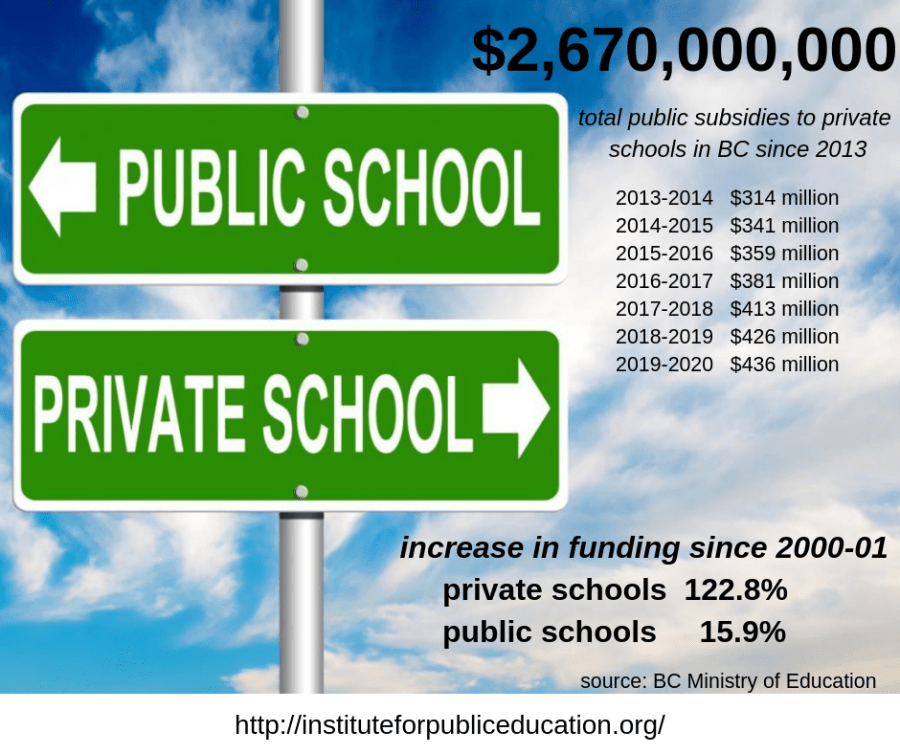
IPE/BC has submitted its recommendations to BC’s Select Standing Committee on Finance and Government Services for the upcoming year’s budget. Our submission reflects IPE/BC’s basic values and focuses on the following:
- Recognizing that public education is in the public interest and a critical element of our democratic society.
- Focusing funding initiatives to support the most vulnerable students.
- Avoiding a return to austerity to be able to recover from the damage of previous austerity measures.
- Defunding private/independent schools.
- Planning to incorporate remedies for the climate crisis in all areas of public education.
You can read the submission here.
We welcome feedback in our efforts to support public education in BC.
 You can check out our analysis of public funding for private schools in BC, and our arguments for discontinuing these subsidies to private schools,
You can check out our analysis of public funding for private schools in BC, and our arguments for discontinuing these subsidies to private schools,  residents across the province. A new poll finds that four-in-five British Columbians (78%) oppose providing taxpayer funds for elite or preparatory private schools in the province, with a total of 60% being strongly opposed to the idea.
residents across the province. A new poll finds that four-in-five British Columbians (78%) oppose providing taxpayer funds for elite or preparatory private schools in the province, with a total of 60% being strongly opposed to the idea.

 One such feature is school choice. “Choice” takes place in a variety of ways: the open catchment areas; allowing and increasing public funding of private schools; allowing school fees; and promoting niche schools and academies. With only limited opposition (from parents, teachers and school trustees) “choice” policies have changed the nature of BC’s public school system. The impact of these changes is that we are moving from a more comprehensive, equitable, neighbourhood and community oriented, publicly administered school system, towards a semiprivate, stratified and segregated system in which precious limited resources are increasingly allocated to a privileged minority.
One such feature is school choice. “Choice” takes place in a variety of ways: the open catchment areas; allowing and increasing public funding of private schools; allowing school fees; and promoting niche schools and academies. With only limited opposition (from parents, teachers and school trustees) “choice” policies have changed the nature of BC’s public school system. The impact of these changes is that we are moving from a more comprehensive, equitable, neighbourhood and community oriented, publicly administered school system, towards a semiprivate, stratified and segregated system in which precious limited resources are increasingly allocated to a privileged minority. Yet another form of school choice is the Academy, or niche program. There are sports academies, and arts academies, but also academic academies such as International Baccalaureate programs, honours programs, and challenge programs. These
Yet another form of school choice is the Academy, or niche program. There are sports academies, and arts academies, but also academic academies such as International Baccalaureate programs, honours programs, and challenge programs. These  specialty programs often have competitive enrolment processes, and often require the payment of school fees (typically $2000 – $5000, but as much as $17,000/year). Thus, they are available only to a small subset of students.
specialty programs often have competitive enrolment processes, and often require the payment of school fees (typically $2000 – $5000, but as much as $17,000/year). Thus, they are available only to a small subset of students.

 The most successful colonizer has been Google. A recent report indicates that Google’s G-Suite for Education is being used by half the teachers and students in the U.S. Canada is fast approaching the same level of use. It includes a range of free software tools that can be used by students and teachers—word processing, presentations, spread sheets and the like. G-Suite incorporates “Classroom,” an integrated learning management system that keeps track of grades, attendance and more. And, of course, YouTube is linked to student use.
The most successful colonizer has been Google. A recent report indicates that Google’s G-Suite for Education is being used by half the teachers and students in the U.S. Canada is fast approaching the same level of use. It includes a range of free software tools that can be used by students and teachers—word processing, presentations, spread sheets and the like. G-Suite incorporates “Classroom,” an integrated learning management system that keeps track of grades, attendance and more. And, of course, YouTube is linked to student use. It is less expensive than other computers because much of what it needs to operate is supplied by Google in the cloud—operating software, applications and memory. No need to build those into the computer. According to market reports, Chromebooks make up the majority of all computers sold to schools in the U.S. and are marketed globally.
It is less expensive than other computers because much of what it needs to operate is supplied by Google in the cloud—operating software, applications and memory. No need to build those into the computer. According to market reports, Chromebooks make up the majority of all computers sold to schools in the U.S. and are marketed globally.
 On December 7th, IPE/BC (with the support of Your Education Matters) held a Think Tank to discuss the wide range of issues around privatization in public education in British Columbia. IPE/BC Fellows, teachers, researchers, and community leaders came together to consider what issues to address and how strategically to do so. Joel French, Executive Director of
On December 7th, IPE/BC (with the support of Your Education Matters) held a Think Tank to discuss the wide range of issues around privatization in public education in British Columbia. IPE/BC Fellows, teachers, researchers, and community leaders came together to consider what issues to address and how strategically to do so. Joel French, Executive Director of